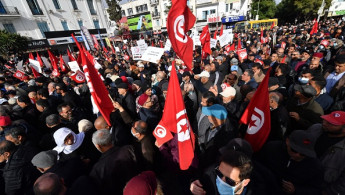Tunisia: Opposition to sue President Saied in 'international court' over arbitrary detention
In Tunisia, the defence committee of political detainees has vowed to sue President Saied and his officials over the arbitrary detention of over fifty opposition figures.
"After 14 months in custody, those arrested on charges of conspiring against state security have not had any charges proven against them. However, authorities insist on keeping them in prison," said Islem Hamza, a committee member, in a press conference on Tuesday, 16 April.
Here's a breakdown of the terrorism case against Tunisia's key opponents of Saied's rule and the defence team's plans for legal action against the president and his officials.
How did the case start?
The case was initiated on 10 February 2023 after the Anti-Terrorism and Organised Crime National Unit sent a letter to the Minister of Justice, Leila Jaffel, stating that "certain individuals were conspiring against the security of the state."
The letter contained only that one sentence, according to local media Inkyfada.
On the same day, the letter was also sent to the Public Prosecutor at the Court of First Instance of Tunis, instructing them to "undertake and authorise the necessary investigations."
Since then, fifty-two people have been tried for conspiracy against state security under the controversial anti-terrorism law.
Passed in 2015, the law defines terrorism as "causing harm to private and public property, vital resources, infrastructure, transportation and communication means, computer systems, or public services."
Such an overly vague and ambiguous definition of terrorism could allow for the repression of certain acts that are not "terrorist nature" under international law, according to Amnesty International.
Over a year later, what happened?
The investigation into the fifty-two figures was concluded on 16 April. The charges were upheld against forty and dropped for the rest.
The charges include "forming a terrorist cell, donating money to a terrorist organisation, conspiring to change the state's form, and committing a heinous act against the president."
However, as of Wednesday, the defence committee said they have not yet seen the final report.
According to the defence committee, by processing the case as a terrorism-related one and continuing the investigation using the specialised unit, authorities were able to obscure it further and reject attempts to identify the details of the charges and the evidence on which they were based.
The final report is set to be made public on Thursday or Friday, 19 April.
Among those detained are activists and political figures Khayam Al-Turki, Issam Chebbi, and Jawhar Ben Mubarak.
What matters now for the defence committee is the release of the detainees as there is no legal framework legitimising their detention past Friday's midnight.
However, the defence committee fears that there are ongoing 'illegitimate' plans to bypass the limited pre-trial detention to keep the arrested figures behind bars.
Why is Saied a key player in the case?
Tunisian President Kais Saied has never hidden his investment in the case against what he calls the "conspirers."
Over the past months, Saied has publicly pressured judges to assume the "historical responsibility" in prosecuting those accused of conspiring against Tunisia.
He also said, "Whoever acquits them is their accomplice," which the defence team of the detainees considered a direct threat and interference with justice.
On Tuesday, Saied criticised the lengthy processes against the detainees, demanding an urgent trial.
"Money is still flowing to them from abroad through associations," he claimed.
For the detainees' defence team, the case is purely political. "The detention orders were issued politically and will only be lifted politically," argued Dalila Mssedek, a committee member.
"We will hold accountable anyone responsible for keeping the political detainees after midnight on Friday. We will resort to international courts and all judicial bodies and international entities to demand their release," she added.




 Follow the Middle East's top stories in English at The New Arab on Google News
Follow the Middle East's top stories in English at The New Arab on Google News

![A group of Palestinians, foreign and Israeli activists gather to participated in an olive picking event on the land in the town of Battir, which is under threat of confiscation by Israel in Bethlehem, occupied West Bank on 8 November 2024. [Getty]](/sites/default/files/styles/image_330x185/public/2182930803.jpeg?h=199d8c1f&itok=__0LgGsa)
